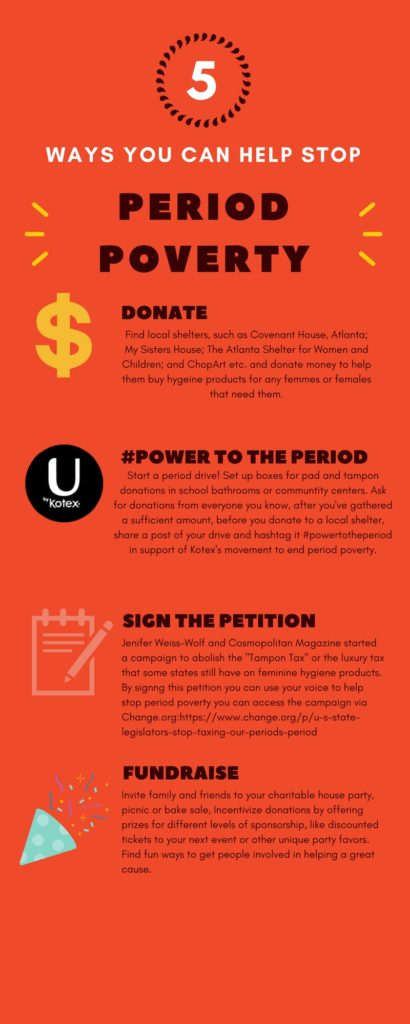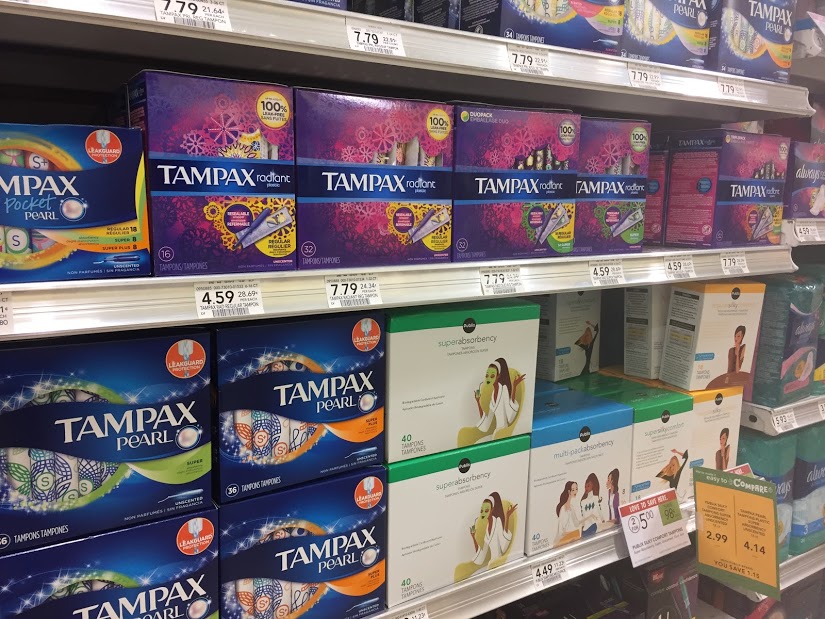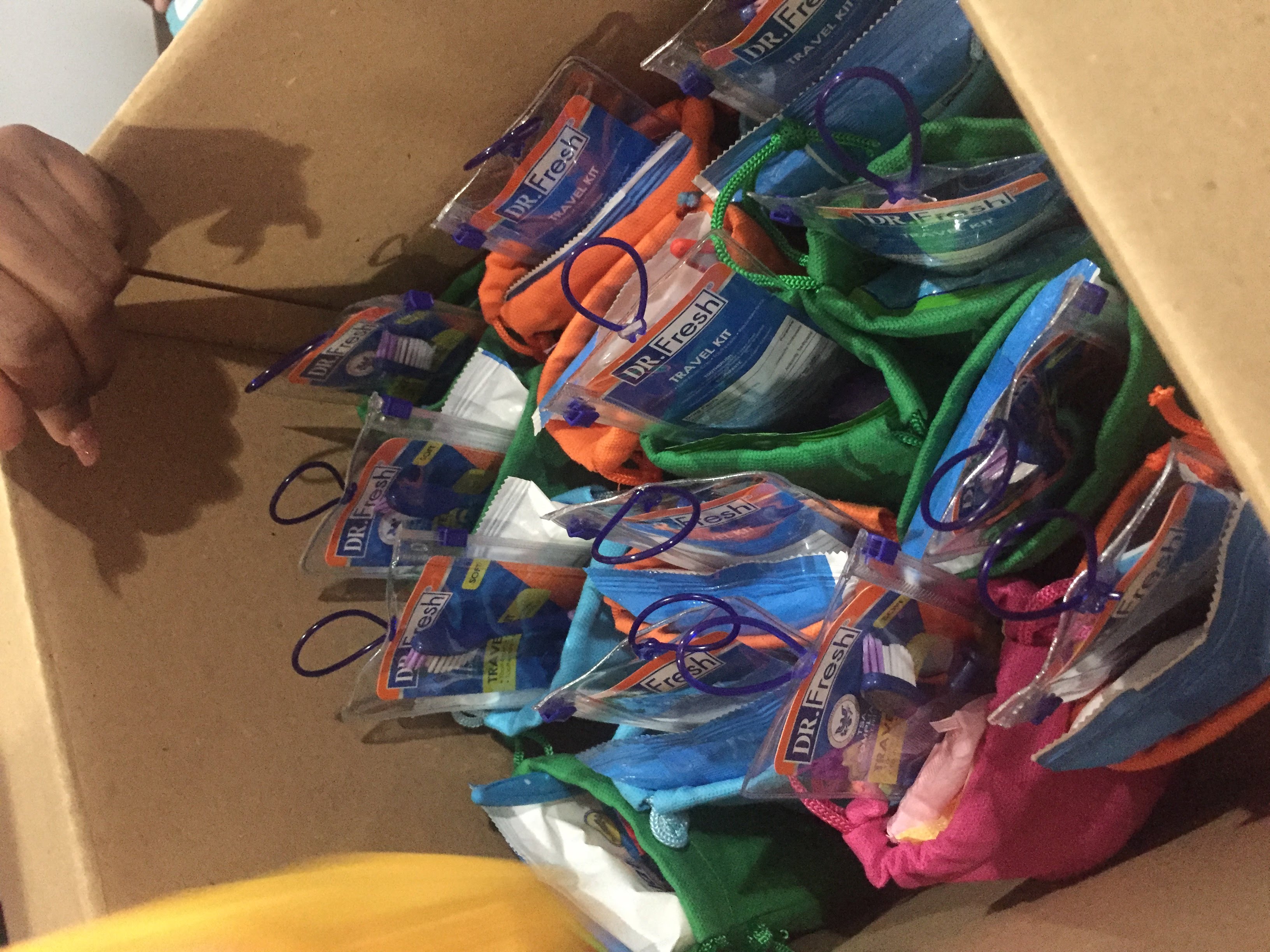Like most people, maintaining my hygiene and cleanliness is very important to me. As a woman, I like to know that I will be able to be fresh, clean and comfortable when that time of the month rolls around. Women experiencing homelessness, however, do not always have this luxury. Their period is often a question of whether to spend their money on a box of tampons or pads, or to be able to afford their next meal. Imagine being forced to make use of cloth or a newspaper to avoid just sitting uncomfortably while going through menstruation. This is a harsh reality that people who are experiencing homelessness on their period have to go through on a monthly basis.
What You Should Know
Last year, I visited a shelter for women in Atlanta called My Sister’s House, located on Howell Mill Road. The shelter also provides women with counselors, referrals to job training programs and help in finding housing, medical and legal resources. I was amazed at everything this shelter was doing to help women, but I wondered how they coped while on their periods.
One of the women working there told me that one of the number one problems women who had been on the streets faced before coming to stay at the shelter was maintaining hygiene, and at shelters like this, such products are one of the top things requested when people ask about making donations.
This is not a new problem. Roughly 42 million women live in or close to poverty, according to 2014 statistics from the Shriver Report, a nonprofit dedicated to raising awareness around defining issues in women’s lives. With tampons and sanitary napkins for menstruation being charged as a luxury tax in most states, it is hard for people experiencing homelessness to afford them. Why should homeless and displaced people be forced to choose between period products or their next meal?
Menstruation products became a $15.2 billion industry by 2017 in the United States alone, according to market research from Global Industry Analysts, Inc. For a person with no means or limited resources, purchasing feminine hygiene products every month can be almost impossible. People aren’t being charged to pee in a public restroom, so why should people who menstruate be charged to manage something they have no control over? If having a period was a luxury, wouldn’t it be a choice?
Knowing there are teens my own age forced to miss school just because they do not have proper access to the essentials needed to handle their period made me want to take action. With a group of my peers who are a part of My World, a global citizenship for teens nonprofit, I helped gather and pack hygiene kits for youth who are homeless to be donated to ChopArt, a local program for teens experiencing homelessness.
 According to The Partners for Home’s Point-In-Time Count of homeless individuals and families, 58 percent of the homeless population in Atlanta — just more than 4,000 people — are female.
According to The Partners for Home’s Point-In-Time Count of homeless individuals and families, 58 percent of the homeless population in Atlanta — just more than 4,000 people — are female.
The health risks and shame facing people experiencing homelessness while also menstruating, and the struggle of having lack of access to regular shower and toilet use seems almost unbearable. In addition to advocating for regular donations of menstrual products to local shelters and reform on the tampon tax, what is also needed are laws that require all public restrooms and shelters to provide tampons and pads.
This is an issue that should matter to everyone. This issue is important because tampons and pads are a basic human necessity that anyone who needs them should have access to. Menstruation needs to be taken seriously. People who menstruate shouldn’t have to worry when they get their period; pads and tampons should be made as accessible as possible. This crisis is a matter of human dignity and basic health and it needs to be dealt with.
What is Being Done?
Homelessness is not a problem we can immediately solve. However, it is possible to relieve unnecessary suffering. It isn’t hard to find organizations working to reduce period poverty in the Atlanta area. The Atlanta-based nonprofit Peach Coven claims to be “a small group of locals helping to provide menstrual products to all monthly bleeders no matter the gender, orientation, race or religious views of the individual.” They publish a how-to for creating hygiene kits to donate to shelters and other ways to help.
U by Kotex’s Power To The Period social media campaign started more than 50,257 drives and collected 585,965 period products around the country in partnership with DoSomething.org.
Girls Helping Girls. Period. is a “volunteer effort” to educate people on period poverty and help girls and young women from low-income families or those who experience homelessness. By visiting their website you can make a donation or learn how to hold a period party in your own community. Fifty dollars can help one girl period for an entire year.
#HappyPeriod is a nonprofit that provides menstrual products to people who experience homelessness or live in poverty. They hold drives and gather hygiene kits which are then donated to local shelters and given to unsheltered individuals. Their website lists ways you can support by holding your own drive, making a donation or even forming a chapter in your community.
 Zakirah, 17, is a senior at W.D Mohammed High School.
Zakirah, 17, is a senior at W.D Mohammed High School.








